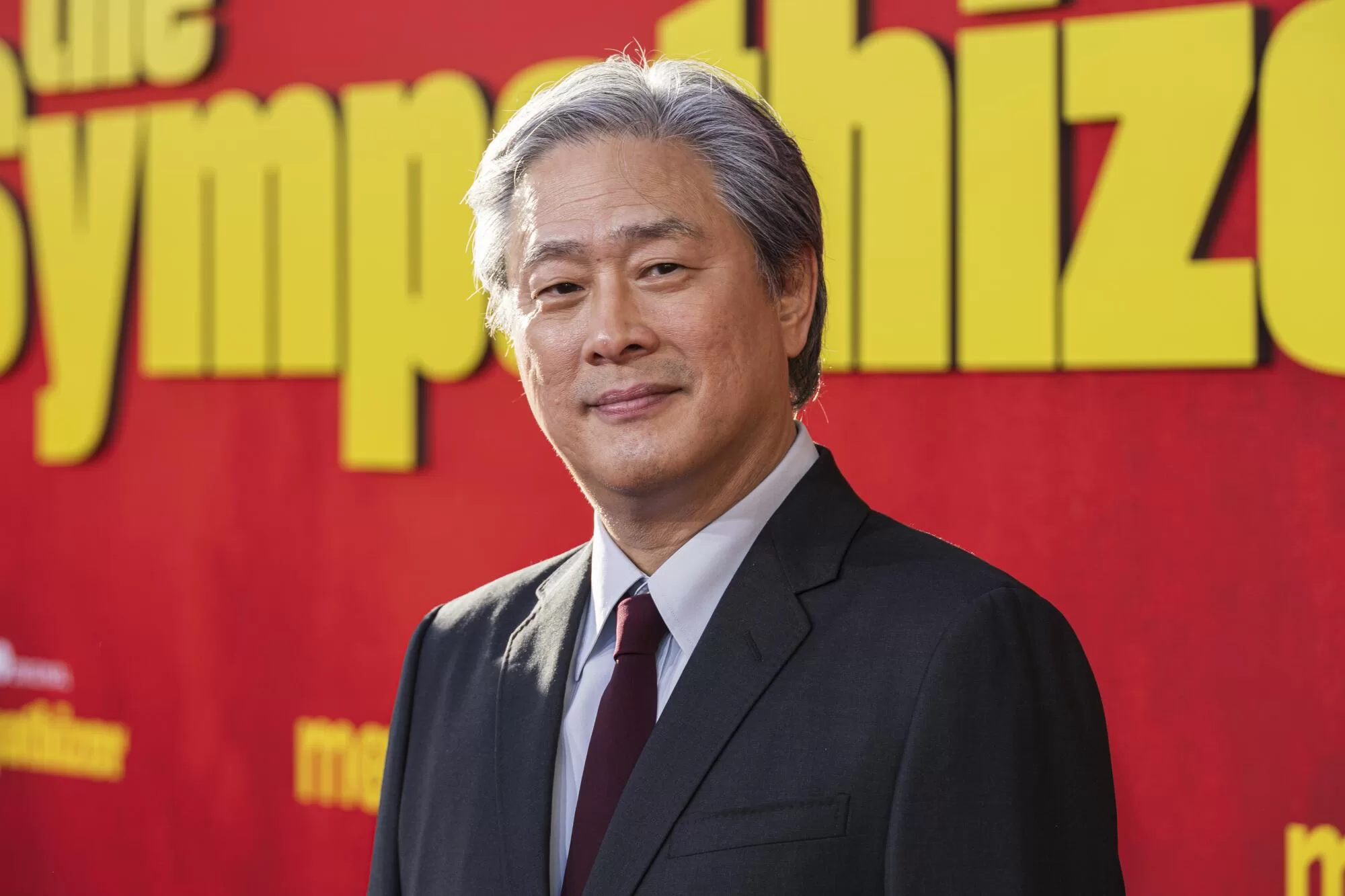The South Korean filmmaker co-created “The Sympathizer,” with Don McKellar (“Last Night,” “The Red Violin”). and directed the first three episodes of the seven-part HBO miniseries, premiering Sunday. The show, produced with A24, faithfully traces the plot of Viet Thanh Nguyen’s 2015 Pulitzer Prize-winning novel, centering the voice of the narrator, known simply as The Captain, played with cheeky verve by Australian actor Hoa Xuande, who is of Vietnamese descent.
The Captain is a walking paradox, the son of a Vietnamese villager mother and a French priest father. (France colonized Vietnam in the mid-19th century and its undue cultural influence pervaded the country.) He was raised in Vietnam and went to college in the U.S., and has a deep understanding of both Eastern and Western cultures.
The story begins in 1975, with the fall of Saigon. Throughout the Vietnam War, The Captain is a North Vietnamese spy working in the South Vietnamese army, which is backed by the U.S. As Saigon falls to the North, he is directed by Man (Duy Nguyen), a fellow communist and close friend, to follow the South Vietnamese community to the U.S. as a refugee and remain embedded there, reporting back.
The first episode culminates with the dramatic, last-minute evacuation of Saigon, filled with explosions and rockets whizzing by. It’s the feeling Park said he felt when he read the novel. The motif returns later when Fourth of July fireworks go off during an assassination.
Like the book, the show is tongue-in-cheek, while also addressing heavy concepts — war, trauma, histories of colonialism and racism. Park’s directorial vernacular, which pairs brutal subject matter with black comedy, interlocks neatly with Nguyen’s satirical style.
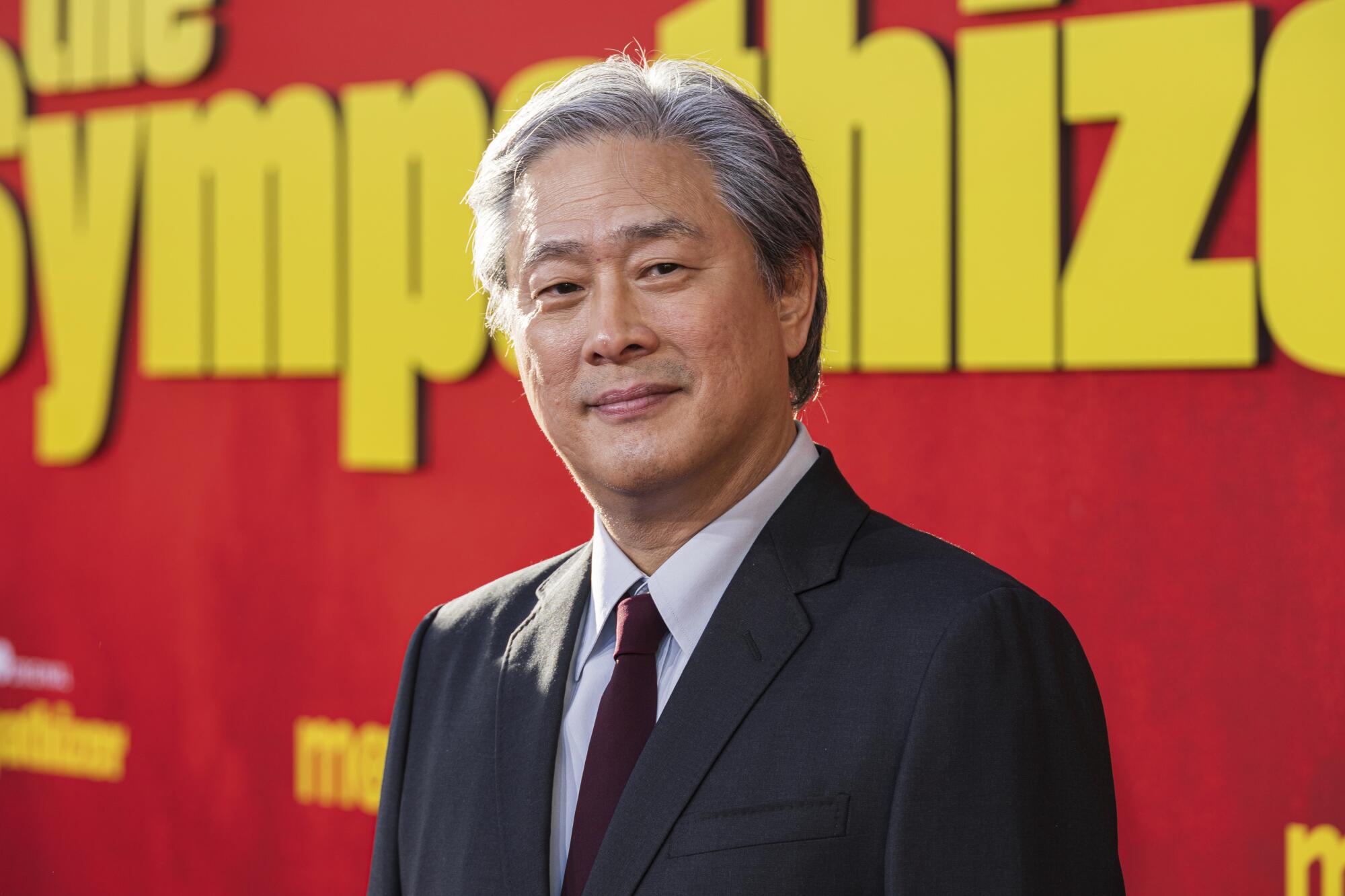
(Willy Sanjuan/Invision/Associated Press)
“Believe it or not, I’m a director who puts significant importance in humor when I go about making a movie, because I believe — when the humor is combined with tragedy or violence — it actually makes it even more powerful,” Park said through his interpreter, the filmmaker Jaehuen Chung. “And that composite is what enables you to express in totality what a human being is, or what life is.” The audience might not be laughing out loud, he said, “but my hope is that it would at least bring a bitter smirk or smile onto their face.”
Five days before “The Sympathizer” premiere, Park was in Los Angeles for press, and we spoke over a video interview. He was wearing a black T-shirt under a black-and-white checkered blazer, framed by black velvet curtains in the background. On the Zoom screen, his name is “Director Park,” using the title as an honorific, common in Korean culture. He is a giant of South Korean cinema — and cinema at large, for that matter. Known for films like “Oldboy,” “The Handmaiden” and “Decision to Leave,” he is a true auteur.
Which is ironic, of course, given that there’s a character in “The Sympathizer,” who is a director known only as The Auteur. The Auteur is making yet another capital “H” Hollywood movie called “The Hamlet,” about the Vietnam War from an American perspective, and he’s a parody of the myopic attitude perpetuated by Western media and the establishment that runs it. There’s are a handful of similar characters: Claude, a CIA agent backing South Vietnam; The Congressman, an anti-communist Republican nicknamed “Napalm Ned” who fought with the South Vietnamese army; and Professor Hammer, who heads the Department of Oriental Studies at Occidental College and fetishizes Asian culture. And they’re all played by one person: Robert Downey Jr., donning various prosthetics and costumes.
Very early on in the development process, when the producers were tossing ideas around, Park suggested having one actor play all those roles. He was partially inspired by Stanley Kubrick, who did something similar with Peter Sellers in “Dr. Strangelove,” another Cold War-era political satire black comedy. “Our original novel’s intention was to have one and the same body having different faces,” Park said. Downey portrays what are in essence the melded faces of American imperialism and colonialism.
1
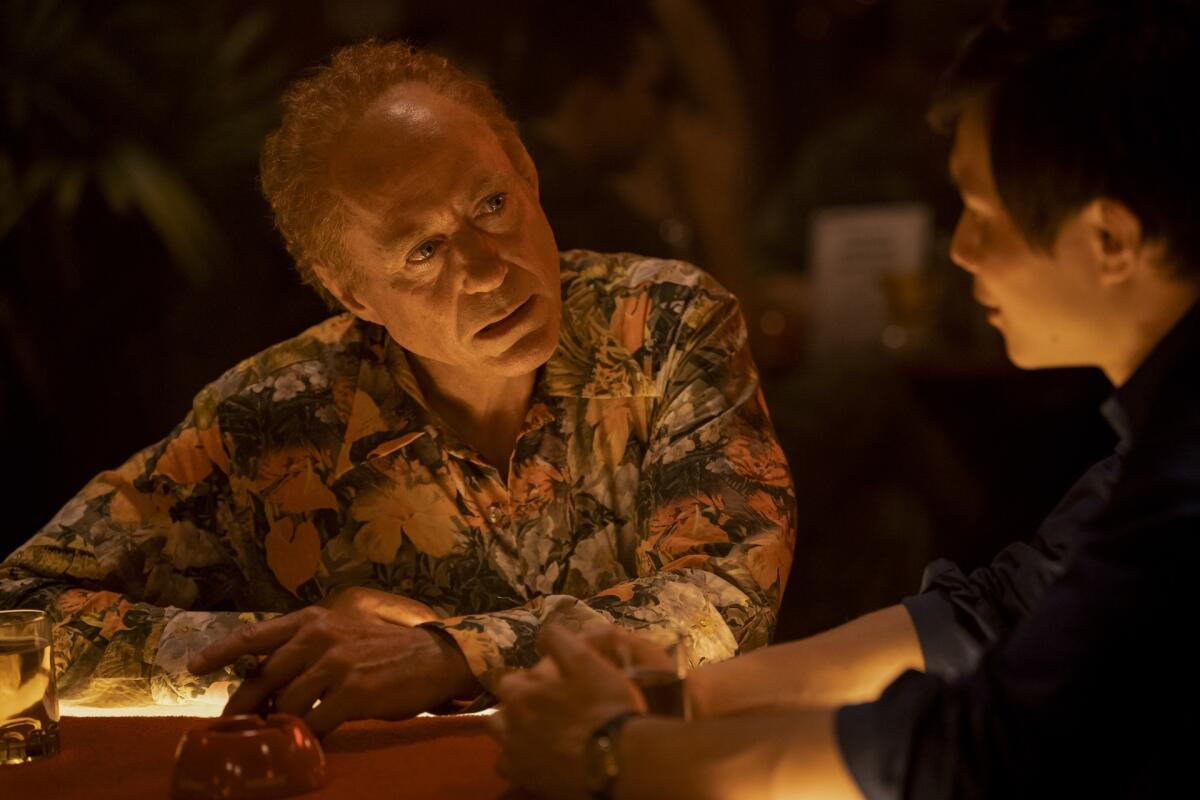
2
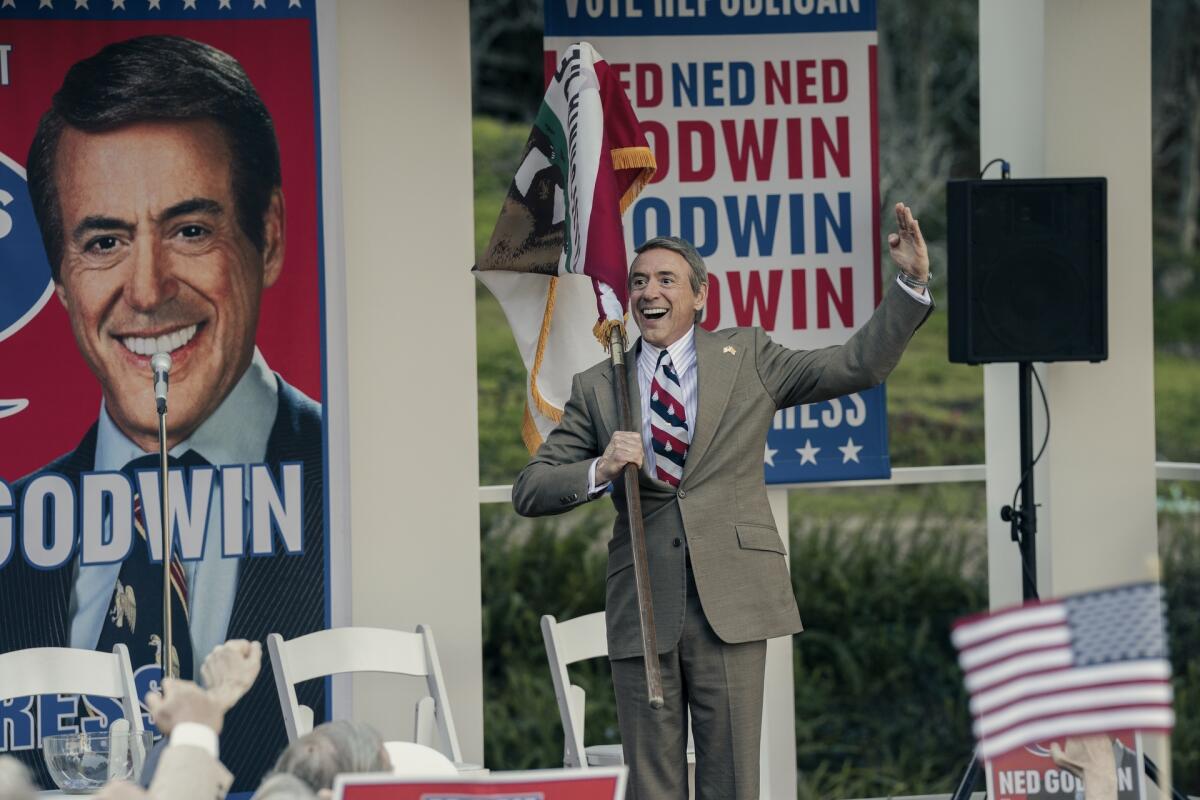
3
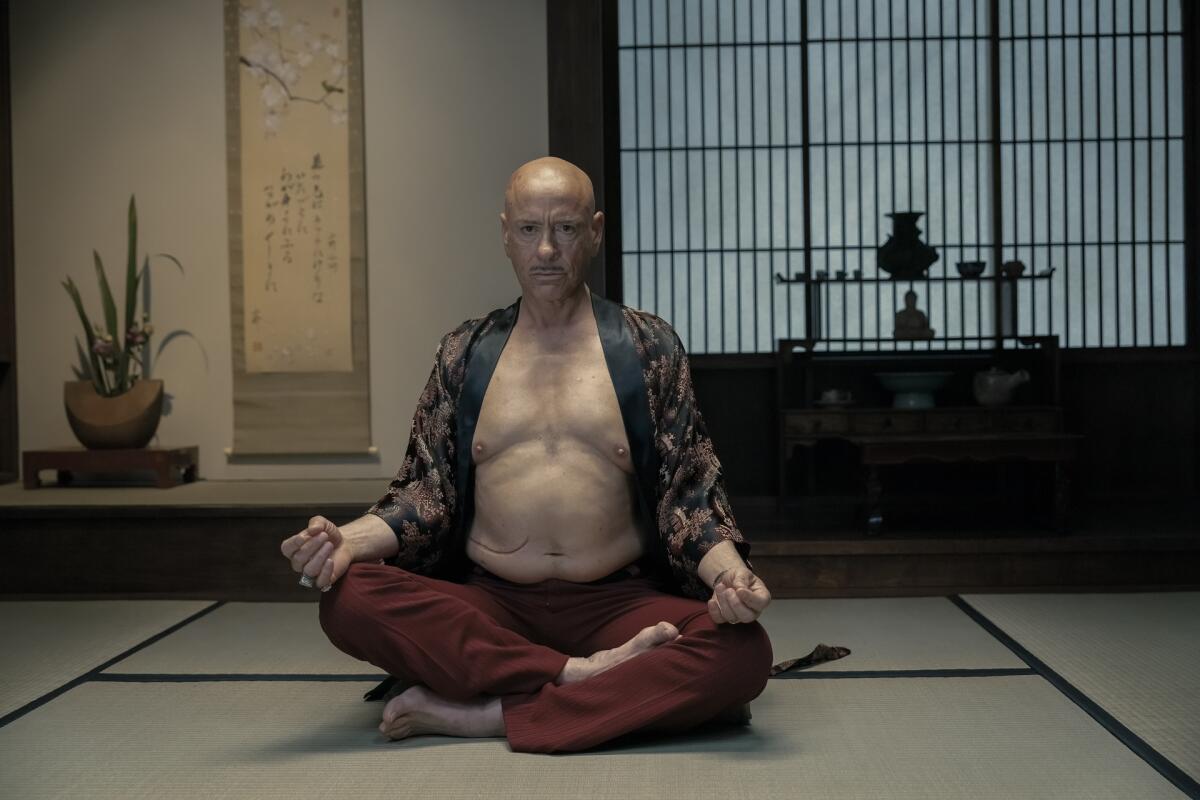
4

1. In “The Sympathizer,” Robert Downey Jr. plays four characters, including the CIA agent Claude. (Hopper Stone/HBO) 2. The Congressman, nicknamed “Napalm Ned.” (Hopper Stone/HBO) 3. Professor Hammer, head of an oriental studies department. (Hopper Stone/HBO) 4. The Auteur, a film director. (Hopper Stone/HBO)
Nguyen said on a phone call as he was walking the streets of Paris that there was an opportunity with “The Sympathizer” “to have a more sophisticated understanding of what racism and colonization have meant and still mean in American society. … When I was writing the book, it was always treating the war in Vietnam as an episode in a much longer history of American imperialism and colonialism.”
“The Sympathizer” — both the book and the series — is chock-full of big ideas like this. They’re packed so tightly and so neatly, like a ream of loose-leaf paper, that it’s hard to extricate one from the next. “It has immense elements, aspects compressed within it,” Park said.
Given that caveat, “the one most important thing I did want to stress is: Whether it be ideology, system, politics, or revolution, they were actually started from pursuit of happiness of the individual,” Park said. “But history tells us that they end up suppressing the individual. And I just wanted to reflect upon it so that we don’t repeat the same history again.”
The Captain is a microcosm of this. “I am a spy, a sleeper, a spook, a man of two faces,” he says in the first line of the book, which Xuande also says in the opening scenes of the show. “Perhaps not surprisingly, I am also a man of two minds. … I am simply able to see any issue from both sides.”
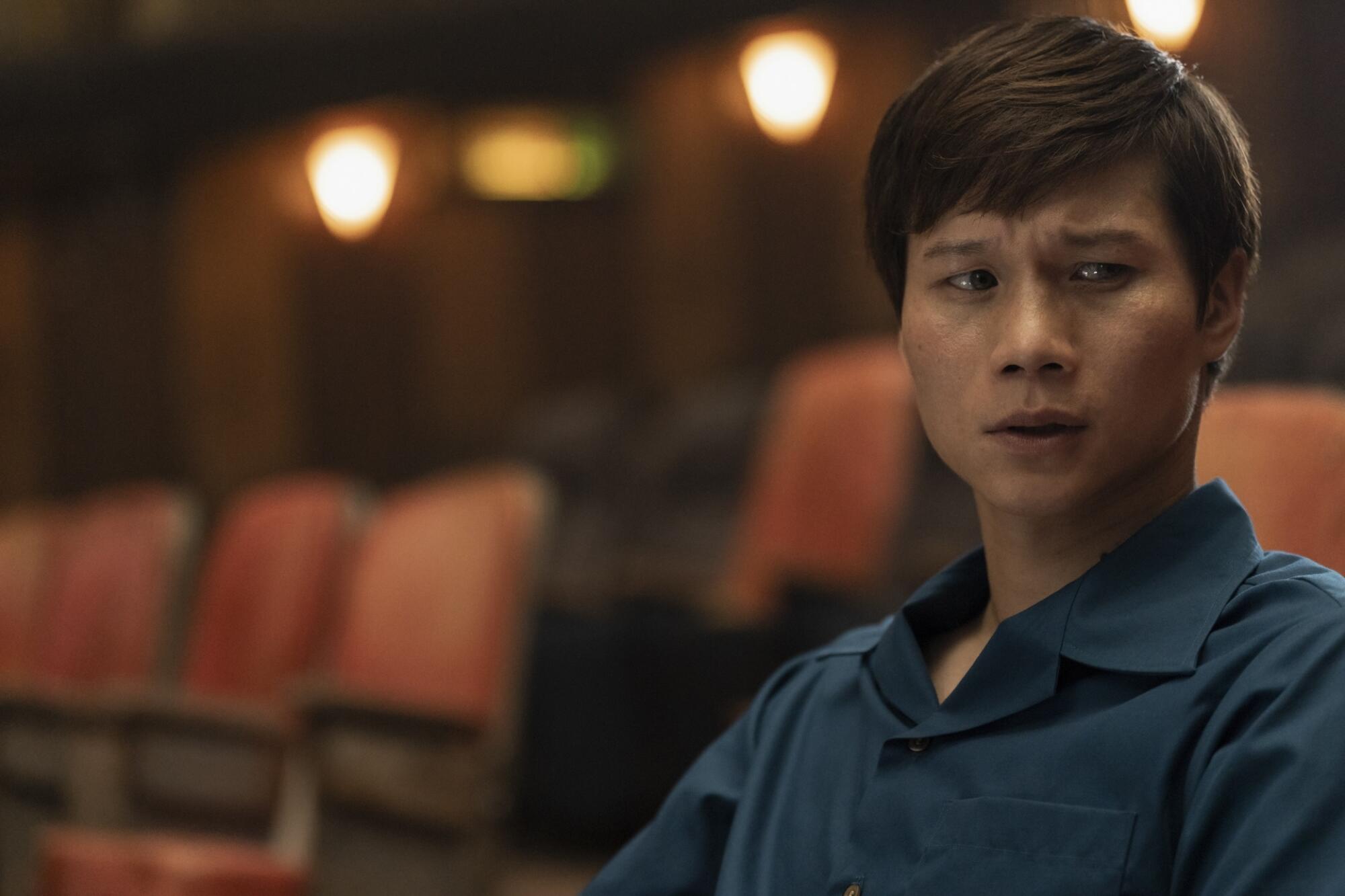
Australian actor Hoa Xuande portrays The Captain, the lead character and narrator in “The Sympathizer.”
(Hopper Stone/HBO)
The show heightens the idea that this story is being told under duress, as a confession tortured out of The Captain, who is under interrogation in a communist reeducation camp back in Vietnam. Buzzing ceaselessly with warring ideologies, The Captain’s mind slowly splinters.
It recalls another fragmentation, also illustrated in this story. Of the Vietnam War — which is referred to in Vietnam, as the show points out, as the “American War” — “it’s saying, ‘Qell, just remember that there’s another side,’” McKellar, the series co-showrunner, said. “Recognize that there’s a Vietnamese side that is central to this story; it’s a Vietnamese story. Look at it from that side. And then realize that that side in itself has two sides and is fractured.”
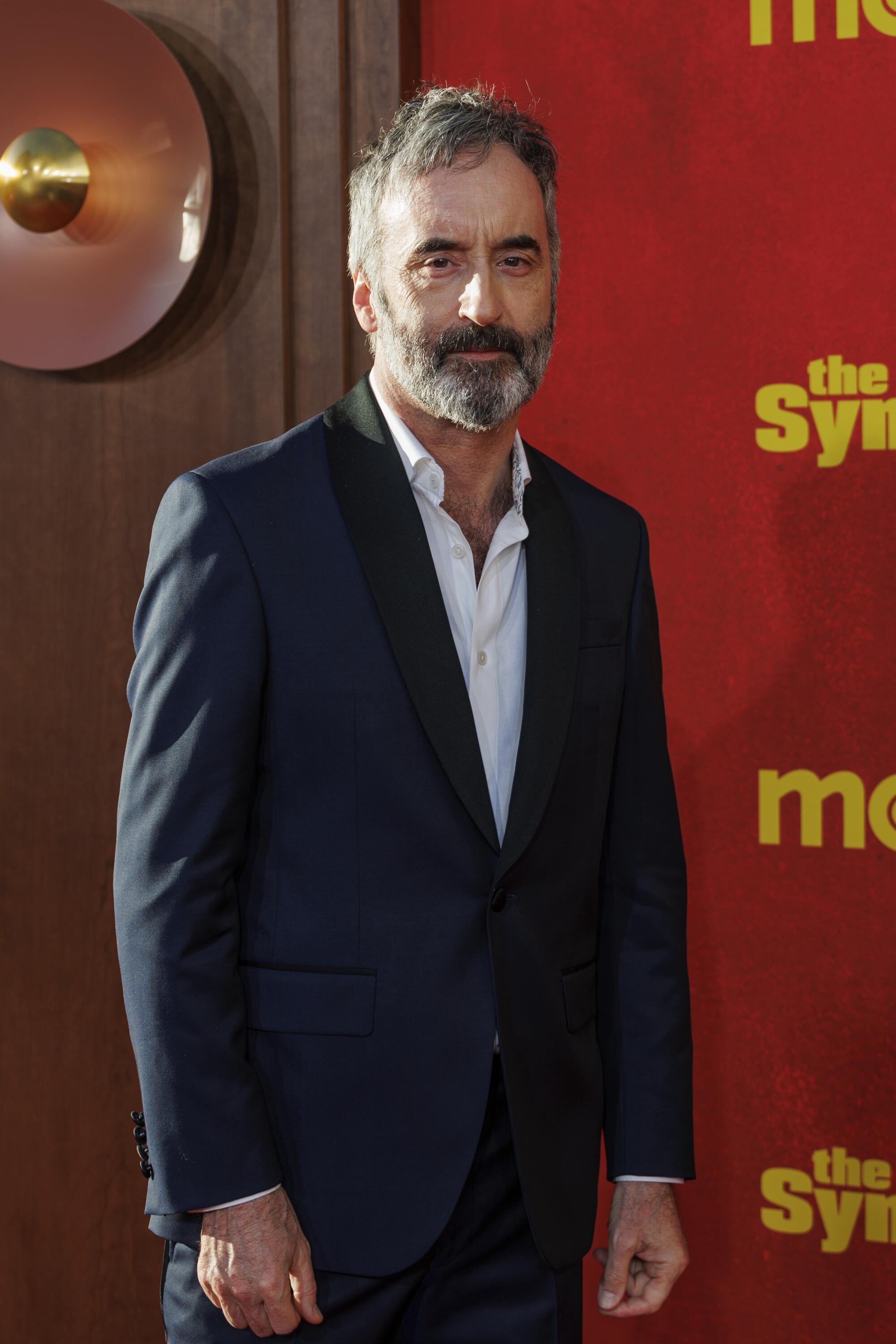
Co-creator Don McKellar at the premiere of “The Sympathizer” on Tuesday in Los Angeles.
(Willy Sanjuan /Invision/Associated Press)
When North Vietnam came under communist control in 1954, Nguyen’s parents fled to the south, where he was born in 1971. Four years later, when Saigon fell, his family fled again, this time to the U.S. If Americans today remember the Vietnam War at all, Nguyen said, it’s through American memories, American stories and the Hollywood version. In this sense, the Vietnamese “have always been the background to the American drama,” he said. (He was on set for the filming of the fake movie within the show, “The Hamlet,” which he said felt absurdly meta.)
“The Sympathizer” was published in 2015 — almost nine years ago exactly — and it took almost five years to sign a deal for the series. When executive producer Niv Fichman finally optioned the book, and it was on its way to becoming a show, some of Nguyen’s prerequisites were that the production would seek out Vietnamese actors, and that as much Vietnamese would be spoken as possible. Putting those faces and voices in front of viewers for seven hours, he said, “has an emotional and visceral and entertaining impact that shouldn’t be underestimated.”
History, for Nguyen, is a continuity. He was working on the book between 2011 and 2013, when the U.S. was fighting wars in Iraq and Afghanistan. While he was writing about the reeducation camp, he was drawing from ’60s CIA torture manuals and thinking about the U.S. torture and prisoner abuse in Abu Ghraib. If anything, he thinks “The Sympathizer” is even more relevant now than at the time of its publication — if you can understand it as more than just a Vietnam War story.
“If part of the point of the TV series is that wars don’t end simply because we say they do, that they continue,” Nguyen said, “then in fact, all the contradictions of American history that have driven Americans from settler colonization to the Vietnam War, have driven us onwards to support Israel in its war on Gaza as well.” (Nguyen has been very publicly vocal about his support for Palestinians in Gaza in recent months.)
The series artfully translates pages and pages of tortured interior monologue in a way that’s deeply compelling onscreen. The ending, like its protagonist, is bruised and battered, but hopeful.
“I feel like the message of the show is: We all contain these internal contradictions, but we can survive them,” said McKellar. “We can persevere. We have no choice. If you look at Vietnam and the people of Vietnam, they have survived, and very well, in fact. So it has to be optimistic.”
